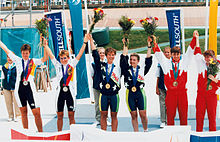Tandem is a para-cycling classification for cyclists that require a sighted pilot for a non-sighted rider. The UCI recommends this be coded as MB. PBS defined this group as "Athletes who are blind or visually impaired compete with no classification system. They ride tandem with a sighted “pilot.”"[1] The Telegraph defined this classification in 2011 as "B: Athletes who are blind and visually impaired" [2] British Cycling defines this classification as: "Blind or Visual Impaired (VI), TCB - from no light perception in either eye up to visual acuity of 6/60 and/or visual field of less than 20 degrees. Classification assessed in the best eye with the best correction (i.e. all athletes who use contact or corrective lenses must wear them for classification, whether they intend to wear them in competition or not). Classification will be provided by a UCI accredited classifier"[3]




Classification history edit
Cycling first became a Paralympic sport at the 1988 Summer Paralympics.[4]
In September 2006, governance for para-cycling passed from the International Paralympic Committee's International Cycling Committee to UCI at a meeting in Switzerland. When this happened, the responsibility of classifying the sport also changed.[5]
Becoming classified edit
Classification is handled by Union Cycliste Internationale.[6] Classification for the UCI Para-Cycling World Championships is completed by at least two classification panels. Members of the classification panel must not have a relationship with the cyclist and must not be involved in the World Championships in any other role than as classifier.[7] In national competitions, the classification is handled by the national cycling federation.[7] Classification often has three components: physical, technical and observation assessment.[7]
Records edit
Below are some historical world records for this classification in the 200m men's Indoor track / Flying start.[8]
| Time | Cyclist | Country | Classification | Date and location | Country location | Reference |
|---|---|---|---|---|---|---|
| 10"749 | Kieran Modra | AUS | Blind Men | 03.05.2003 DUNC GRAY, SYDNEY | AUS | [8] |
| 10"316 | Neil Fachie | GBR | Blind Men | 08.11.2009 MANCHESTER | GBR | [8] |
| 10"777 | Vladimir Alexandr | Blind Men | 08.09.1991 MOSCOW | RUS | [8] | |
| 10"721 | Anthony Kappes | GBR | Blind Men | 13.05.2005 NCC MANCHESTER | GBR | [8] |
| 10"604 | Anthony Kappes | GBR | Blind Men | 05.10.2005 NCC MANCHESTER | GBR | [8] |
| 10"597 | Anthony Kappes | GBR | Blind Men | 05.05.2006 NCC MANCHESTER | GBR | [8] |
| 10"411 | Anthony Kappes | GBR | Blind Men | 06.10.2006 NCC MANCHESTER | GBR | [8] |
| 10"410 | Anthony Kappes | GBR | Blind Men | 11.05.2007 NCC MANCHESTER | GBR | [8] |
| 10"282 | Neil Fachie | GBR | Blind Men | 13.03.2011 MONTICHIARI | ITA | [8] |
Rules edit
The sighted cyclist cannot be a professional cyclist in the past 12 months on any UCI pro tour with the exception of those over 40 years of age. The pair of cyclists must cycle in sync with each other.[2]
Rankings edit
This classification has UCI rankings for elite competitors.[9]
See also edit
References edit
- ^ "Competition at the Highest Levels, Cycling". Cycling. Retrieved 14 June 2012.
- ^ a b "London 2012 Paralympics: Road cycling guide". London: The Telegraph. 2011. Archived from the original on 2011-08-28. Retrieved 14 June 2012.
- ^ "About Disability Cycling". London. 2012. Retrieved 14 June 2012.
- ^ Australian Paralympic Committee (2012). "Cycling". Archived from the original on 2016-08-14.
- ^ "Para-cycling High Performance". Australia: Cycling Australia. Retrieved 14 June 2012.
- ^ "Guide to the Paralympic Games – Appendix 1" (PDF). London Organising Committee of the Olympic and Paralympic Games. 2011. p. 42. Archived from the original (PDF) on 26 April 2012. Retrieved 9 April 2012.
- ^ a b c "UCI Para-cycling Classification Guide". UCI. 17 April 2012. p. 5.
- ^ a b c d e f g h i j "Para-Cycling Track World Records Historical". UCI. Archived from the original on 2 August 2012. Retrieved 14 June 2012.
- ^ "Ranking - PARA - Cycling 2012". Union Cycliste Internationale. June 2012. Archived from the original on 13 June 2012. Retrieved 14 June 2012.